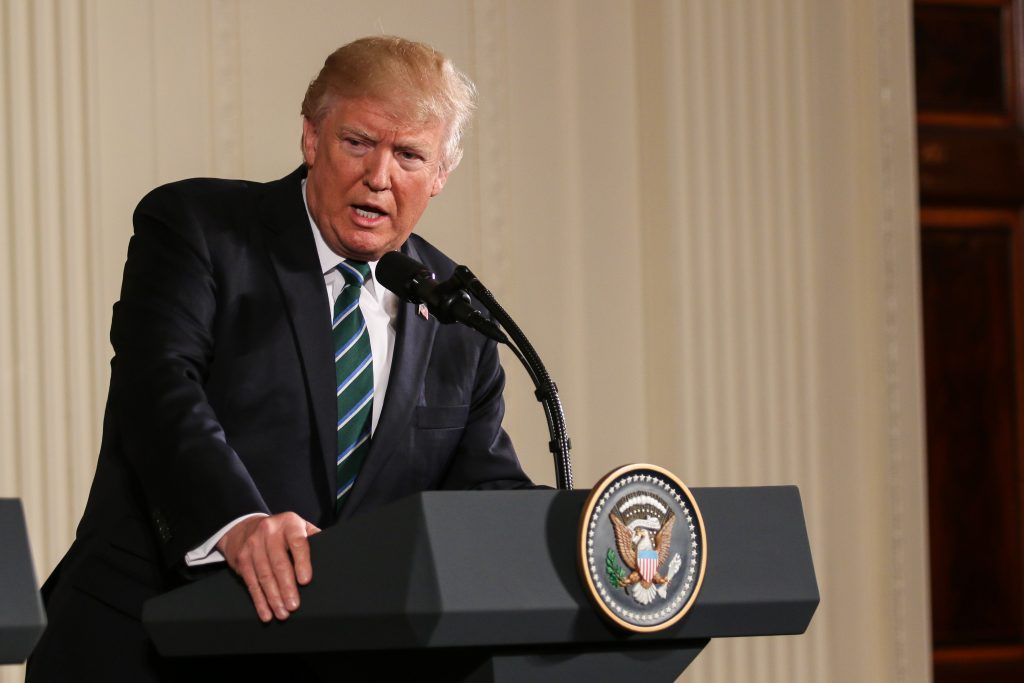Trump’s disregard for climate change is only natural
By Amar Causevic, Egemen Bezci, Nicholas Borroz | March 28, 2018

President Donald Trump’s disregard of climate change is troubling not only for the United States, but also for the world. His blatant indifference toward climate change was one of the indicators that led the Bulletin of the Atomic Scientists’ Science and Security Board to move the hands of the Doomsday Clock closer to midnight in January 2018. The Board argued that the Trump administration “includes avowed climate denialists in top positions” and has “pursued unwise and ineffectual policies on climate change.” Furthermore, the Board wrote: “In its rush to dismantle rational climate and energy policy, the administration has ignored scientific fact and well-founded economic analyses.”
Trump’s attitude should not be surprising. He is a politician, after all, and his primary motivation is to survive politically, not to improve global, or even national, welfare. He positioned himself as the antithesis of liberal political discourse in American politics. His attack on the climate change agenda is just one component of his overall attack on the liberal camp. He is also tied to the fossil fuel industry, which feeds into his political stance. Despite these political realities, social consensus can offer a way forward on climate.
Climate change as a threat. Trump’s campaign against climate protection is happening as extreme weather is already hurting the United States. Hurricanes Harvey, Irma, and Maria inflicted $265 billion in damages last year, and scientists believe that warming temperatures likely contributed to the destructiveness of these storms. The cost of climate change to the United States is only expected to increase: By 2100, if greenhouse gas emissions continue on their current trajectory, there is a 90 percent chance that the poorest third of US counties will experience direct economic damages estimated at between 2 percent and 20 percent of county income. Rising sea levels will destroy property along coastlines; droughts will create agricultural calamities; and heat stress will harm human health.
Climate change also affects other countries, and sometimes this can be to the detriment of the United States. A recent study by Stanford University climate scientist Noah Diffenbaugh and two colleagues reported that “humans have already increased the probability of historically unprecedented hot, warm, wet, and dry extremes including over 50 to 90 percent of North America, Europe, and East Asia.” An extreme example is Syria, where a series of consecutive droughts between 2006 and 2011 was one of many factors that led to revolt against the Assad regime. Although there were many other causes of the civil war unrelated to climate change, the droughts caused food shortages and rural migration to cities, thereby aggravating an already deteriorating economic system. The ensuing civil war fueled the rise of the Islamic State, which the United States military has since spent billions of dollars and too many lives fighting.
The US intelligence community’s recent Worldwide Threat Assessment emphasized the threats posed by climate change: “The impacts of the long-term trends toward a warming climate, more air pollution, biodiversity loss, and water scarcity are likely to fuel economic and social discontent—and possibly upheaval—through 2018.”
It is clear, then, that climate change creates a variety of challenges, both at home and abroad. So how has Trump indicated he intends to tackle this issue?
Trump’s disregard. Soon after becoming president, Trump and his associates signaled their disregard for climate change as a serious threat. The administrator of the Environmental Protection Agency, Scott Pruitt, lessened scrutiny of the energy industry and doubted carbon dioxide emissions’ impact on climate change. The administration proposed allocating 31 percent less money to the EPA and dismissed several members of its scientific review board. NASA’s Earth Science Program, as well as flagship renewable-energy research initiatives at the Department of Energy, were listed for major budget cuts. The EPA has scrubbed most references to climate change from its website.
Trump’s Executive Order on Promoting Energy Independence and Economic Growth has also undermined preexisting environmental laws: It softens the future costs of carbon emissions, withdraws a 2016 moratorium on coal leases on federal lands, and rescinds executive orders and memoranda designed to prepare for climate change-related national security threats. In addition, the order opened a path for the slow abolishment of EPA’s Clean Power Plan, an initiative designed to decrease carbon dioxide emissions from new and existing power plants.
And, of course, Trump decided in June 2017 to withdraw the United States from the Paris Agreement. This announcement, widely criticized at home and abroad, followed statements Trump had made during the campaign, when he described the Paris Agreement as a “bad deal.” As the Bulletin noted in October 2017: “[T]he breadth of Trump’s efforts to overturn climate and other environmental regulations is best seen not by looking at the trees of individual policy initiatives, but at the forest of climate and environmental rules the administration is trying to set afire.”
Disregard’s impact. Trump’s disregard of climate change will hurt the United States. One immediate line of reasoning is that extreme weather events have already drained resources, and if nothing is done to slow climate change’s pace, disasters will become more frequent, requiring even more resources to respond to them. During and after Hurricanes Harvey, Irma, and Maria, the US Department of Defense participated in 311 missions involving evacuations, damage estimate, infrastructure repair, and search and rescue. Abroad, US armed forces will increasingly need to be involved in relief missions.
Second, Trump’s proposal to cut funds to federal agencies such as the EPA—for example, reducing funding for its Great Lakes Restoration Initiative—creates knowledge and operational gaps for dealing with environmental issues. It undercuts the United States government’s ability to gain scientific insights and conduct groundbreaking research on climate change. This diminishes the government’s capacity to react effectively to climate change events such as hurricanes, and to intelligently target policy.
Third, disregarding climate change harms the reputation of the United States abroad. Leaving the Paris Agreement has signaled to other countries that the United States cannot be trusted to follow through on its international commitments. Signing and then rejecting a major international agreement sends the message that American commitments are optional. This reduces the reliability of the United States as a partner, which undermines its ability to pursue national interests abroad. The withdrawal from the Paris Agreement also opened opportunities for other countries, such as China, to displace United States as a leader on climate change.
What’s behind Trump’s disregard? There are several reasons why Trump is ignoring climate change. First, doing so clearly reflects the views of the Republican Party’s leadership. More than 59 percent of Republicans in the House of Representatives, and 73 percent of Republicans in the Senate, doubt humans’ impact on climate change. Half of all Republican voters accept the fact that climate change is happening, but most reject the idea that it is caused by humans. During the first 100 days of Trump’s presidency, Congress voted 42 times against environmental protections. Congressional support helped the administration initiate its blitzkrieg against environmental regulations.
Second, Trump’s stance on climate change is part and parcel of his plan for creating and restoring jobs, and following through on campaign promises. Trump received crucial support from voters in Rust Belt states because of his vow to bring back jobs that have been lost to automation and offshoring, and to revitalize industries such as car manufacturing and coal mining. It is unclear, though, how sustainable these efforts will be. Besides being environmentally damaging, the coal industry is decreasingly attractive to investors. Car manufacturing jobs in the 21st century, meanwhile, are increasingly being performed by robots. Trump enshrined his promises in the America First energy plan, which emphasizes using untapped domestic energy reserves of oil, natural gas, and coal to create jobs, prosperity, and cheap energy. It seeks to free the United States from what Trump and his constituents see as constraining international agreements, of which the Paris Agreement is a prime example.
Third, several of Trump’s close associates who are instrumental in formulating policy doubt the severity of climate change and have strong links to the fossil fuel industry. EPA Administrator Scott Pruitt, for instance, was Oklahoma’s attorney general and has been a stark denier of climate change. Ex-Secretary of State Rex Tillerson was previously the CEO of ExxonMobil, the world’s largest oil company, from 2006 to 2016. Secretary of Energy Rick Perry, in turn, is a former Texas governor who sat on the corporate boards of oil pipeline companies. Finally, Interior Secretary Ryan Zinke has a long congressional history of voting in favor of oil and gas drilling projects on federal lands.
Short-term politics. Climate change is an issue that requires a long-term policymaking approach that is at odds with election-driven politics. This is because any attempt to mitigate future crises raises government spending today. No matter how much a current policy may improve the lives of future generations of citizens, politicians are under pressure to focus on helping the people that elected them, not their grandchildren. This mismatch between electoral terms and the required timespan for long-term policy implementation creates challenges for even the most benevolent politician, much less Trump.
Nonetheless, this does not mean that political leaders cannot build public support for perceiving climate change as a security threat. For example, in Sweden, the public “is keenly aware of and concerned with environmental issues.” And Trump’s predecessor, Barack Obama, believed that US leadership would not just prevent climate change, but also yield economic and technological benefits. In contrast, Trump’s foreign and domestic policies, including those related to climate change issue, “strike hard and fast at urgent challenges, without worrying about cascading effects or long-term consequences.”
Need for a new social consensus. Politicians’ primary concern is politics, which is the pursuit of power. With this in mind, Donald Trump is not doing anything unexpected. Moreover, his rhetoric treats climate change as if it is not an existing phenomena but a liberal hoax. Opposing the climate change agenda is in line with Trump’s larger project of challenging liberal political views.
It may be too late to reverse Trump’s rollback of environmental legislation, but it is important to remember that, going forward, American presidents, and indeed leaders of all countries in the world, will continue to face pressure to put short-term electioneering ahead of more selfless agendas to improve the fate of the planet.
The most important approach to increasing global awareness of climate change is not to write about the problem for receptive audiences in forums such as this. Rather, individuals from all walks of life need to engage others, finding common ground to recognize and deal with the problem. Apart from the ideological stances of group and individual identities, people living in a country find common ground in the impartiality of the rule of law. The social contract among individuals enables them to make, obey, and change laws. In the United States, a plausible approach to climate change is to create bipartisan consensus at the local level wherever possible, circumventing well-funded lobbying activities in the country’s capital.
Such an approach led to Sweden’s recent climate law, which went into effect at the beginning of the year, and takes steps to make the country carbon-neutral by 2045. Representatives from seven out of eight political parties in Sweden, all but the far-right party, developed the law with the motto of “Growing but Sustaining.”
It is important to discuss climate change in a way that is not antagonistic. This is, after all, one of the gripes of Trump supporters: They argue that even if climate defenders are right, they are downplaying Trump supporters’ concerns about job insecurity and the impacts of multilateral deals on American autonomy. Their concerns must be addressed. Creating free and accessible courses to equip people with skills to adapt to economic change can alleviate Trump supporters’ fears. Reaching out to Trump voters and convincing them that climate change is worth fighting is the best way to avoid the continued dismantling of environmental legislation.
Together, we make the world safer.
The Bulletin elevates expert voices above the noise. But as an independent nonprofit organization, our operations depend on the support of readers like you. Help us continue to deliver quality journalism that holds leaders accountable. Your support of our work at any level is important. In return, we promise our coverage will be understandable, influential, vigilant, solution-oriented, and fair-minded. Together we can make a difference.
Topics: Climate Change, Voices of Tomorrow


















its not only the climate change that is a big prob.. think of the gallons of gasoline burnt by the cars, all this shit will come down to earth and eventually flows to the oceans..
i am shit scared about my daughters generations and their generations living in polluted earth.. should we stop burning stuff and gasoline only if oceans turn black?